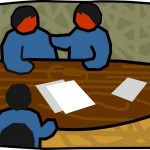The future of Time Management
I still have one more Time Management posting to make about PDAs but am not yet ready to do so. In the meantime I want to begin a new series on meetings. I hope you will find it helpful.
Meetings in abundance
 Do you ever feel that the Lord got it wrong?! When he says he came to give life in abundance do you sometimes feel that he must have meant meetings in abundance? We all seem to attend so many!
Do you ever feel that the Lord got it wrong?! When he says he came to give life in abundance do you sometimes feel that he must have meant meetings in abundance? We all seem to attend so many!
I am sure that many in leadership feel that their lives consist of attending meetings. I don’t mean worship meetings, but planning and strategy meetings, finance and administrative meetings etc. It is obviously vital that such meetings take place in order for your church to move forward to fulfil the vision God has given you. However, do you achieve your goals in the most effective way without feeling overwhelmed by ‘administrative stuff’?
In this short series on making meetings effective I will draw from my own experience and frustrations over 30 years. I have been in many meetings during that time, some as Administrator for Newfrontiers (now one of several administrators who serve this family of churches), some as an elder of Church of Christ the King in Brighton, UK, some as chair of the CCK trustees, and many others. Many of these meetings have been very stimulating, particularly where we have allowed an extensive time for prayer at the start and God has revealed things to us prophetically. I would not describe others in such a positive way, those where I have been wondering how long till we finish and I can get on with the things I would be doing if I was not attending meetings!
My story
Let me start with a personal history. When I first joined Terry Virgo as his administrator in 1980 he asked me to sit in on all meetings he took part in whether in a Newfrontiers context (called Coastlands in those days) or in a church context (then called Clarendon Church). Accordingly I attended elders meetings, not that I was an elder at that stage. They were held in elders’ homes and their wives kindly provided superb meals.
At the first meeting the elders gathered and Terry asked what they wanted to discuss. The evening proceeded, discussion took place and everyone went home. On the next occasion a similar pattern was followed, including the things to be discussed being similar to those that had been discussed the previous week! No notes had been taken, nor actions agreed or acted upon. So we had a re-run of the previous meeting (loosely speaking). This was very frustrating (but the meals were good!).
One of our number was very anti-administration and so I knew I had to tread carefully if I was going to suggest greater effectiveness. After a few weeks I asked Terry during the day what he wanted to achieve from the meeting. I then took a piece of paper and drew 2 columns. In the left one I wrote a list of Terry’s topics, photocopied it and handed it out to all members on arrival with the suggestion they might like to make a note of any action. I tried to keep a full record. Through the discussions we gradually became sufficiently disciplined to ensure that an action was decided and by whom it was to be taken. It then took only a few weeks of embarrassed silence at the start of subsequent meetings for people to realise that they were meant to act on the agreed actions!
The way forward
The normal practice now for any meeting I attend or lead is to have pre-circulated agendas, and clear notes of the meetings with agreed and designated actions. Over the next few weeks I shall share about agendas, minutes, meeting dynamics and so on. Meetings do not have to be dry but they do have to be effective. I trust I can help you achieve this in your context.
